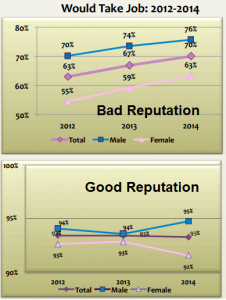 What’s the cost of a poor corporate reputation? Quite a bit, at least in terms of talent acquisition.
What’s the cost of a poor corporate reputation? Quite a bit, at least in terms of talent acquisition.
Companies like Toyota Motor Co. and energy giant BP may still be able to hire talented workers, but they’ll have to pay them significantly more than others that have never been the subject of criminal investigations.
A survey sponsored by global recruitment firm Alexander Mann found that a damaged corporate reputation won’t keep workers from hiring on — 70 percent said they’d take a job — but the salary bump would have to be better than 53 percent. Contrast that with the 93 percent who said they’d leave their current employer to go with a company that had a good reputation. And, on average, they said they’d accept a raise of about 33 percent.
The annual survey, produced in conjunction with Corporate Responsibility magazine, was first reported at the magazine’s COMMITForum this past fall. Discussing the findings, Adam Shay, global head of employer brand management services at Alexander Mann Solutions, said, “It shows that a bad reputation has the potential to cost companies real money in terms of higher recruiting costs, increased difficulties in sourcing and onboarding new hires, and the higher salaries needed to attract candidates.”
As striking as the salary differential is, companies with poor reputations find it harder to hire the most experienced workers. The survey found workers up to age 44 to be least concerned about corporate reputation. Eight in ten millennials, for instance, would take a job with a troubled company. But once you get to more senior workers, the percentages willing to jump to a poor reputation company drop precipitously. Only 56 percent of those in the 55-64 bracket would change jobs.
There’s also a gender difference. Women are much less likely than men to leave their current job for one at a company with a poor reputation. More women than men also say it’s important to them to work for a company whose CEO is actively involved in corporate responsibility and/or environmental issues.